From Shkëlqim Abazi
Part twenty-six
Memorie.al / I were born on 23. 12. 1951, in the black month, of the time of mourning, under the blackest communist regime. On September 23, 1968, the sadistic chief investigator, Llambi Gegeni, the vile investigator Shyqyri Çoku, and the brutal prosecutor, Thoma Tutulani, mutilated me at the Department of Internal Affairs in Shkodër, split my head, blinded one eye, and deafened one ear, after breaking several ribs, half of my molar teeth and the thumb of my left hand. On October 23, 1968, they took me to court, where the wretch Faik Minarolli gave me a ten-year political prison sentence. After they cut my sentence in half because I was still a minor, a sixteen-year-old, on November 23, 1968, they took me to the Reps political camp, and from there, on September 23, 1970, to the Spaç camp, where on May 23, 1973, in the revolt of the political prisoners, four martyrs were sentenced to death and executed by firing squad; Pal Zefi, Skënder Daja, Hajri Pashaj and Dervish Bejko.
On June 23, 2013, the Democratic Party lost the elections, a perfectly normal process in the democracy we aspire to. But on October 23, 2013, the General Director of the “Rilindja” government sent order No. 2203, dated 23.10.2013, for; the dismissal from duty of a police employee. So Divine Providence intertwined with the neo-communist Rilindja Providence, and, precisely on the 23rd, I was replaced, no more, no less, by the former operative of the Burrel Prison Sigurimi. What could be more meaningful than that?! The former political prisoner is replaced by the former persecutor!
The Author
SHKËLQIM ABAZI
Continued from the previous issue
R E P S I
Forced labor camp
Memoir
About twenty-three years would pass from this event. The new winds of democracy had already deeply shaken the exhausted foundations of communist Albania, but meanwhile they had awakened the faded hopes in the hearts of the long-suffering people and especially, warmed the souls of the political prisoners. The last of them were released from the prison in Kosova e Lushnjes, under the unceasing calls of the December students and the Democratic Party, and with the pressure of the International Community.
With the fall of the last domino stone in Europe, we, the prisoners who were still alive, set out to create the National Association of Former Political Prisoners and Persecuted of Albania. As one of the youngest of the old prisoners of the sixties, now of legal age, with the appeal of my elderly friends, and especially the children of those who were no longer alive, I was engaged to represent them in these meetings. With the enthusiasm of freedom, we tried our best to be as useful as possible in this initiative. These months I had to meet many former old and young prisoners, including some of those who had not maintained a correct attitude in prisons.
But anyway, the time for the Great Forgiveness had arrived. On the eve of the triumph of democracy in 1991, the Constituent Assembly of the Pan-Albanian Association of Former Political Prisoners and Persecuted of Albania was held. In the hall of the “17 Nëntori” sports palace (today owned by the Autocephalous Orthodox Church of Albania), there was not enough space. The meeting was planned to be held in the Palace of Culture, in the center of Tirana, but the very wide participation, with an unforeseen number, caused it to be postponed for several hours and a more suitable place to be found.
Thousands and thousands of people, more than ever before, poured there that day, several thousand others remained outside and overpopulated “Kavaja Street”. Only the expected visit of the American Secretary of State James Baker managed to gather so many people in the square. This massive presence showed how real was the number of those hit by the communist system and how deeply Albanian communism had extended the tentacles of class warfare in the rotten society.
At the end of the meeting, in the company of some of my friends, we set off for the center to drink a celebratory coffee, for the special event. I was with Osman Kazazi, Tanush Kaso, Pjetër Arbnor (at that time a member of parliament who came out of the first elections on March 31), with Agim Musta, Eqerem Kavaja, and others. Everywhere you looked, you only saw groups of former prisoners, who met with longing, after many years of separation. Near the State Bank, someone called me by name; I separated a little from the group and went to the person who was waiting on foot. In front of me stood a decrepit, small and thin old man, huddled and crouched under a wide jacket, with a long-brimmed hat on his head, which made him look even smaller than he really was. The exhausted figure did not remind me of anyone, but out of courtesy I extended my hand friendly.
Undoubtedly, he must have been a known person forgotten by the distance of the years! – “How is your health?” – I asked without mentioning a name. In fact, I couldn’t remember his face, let alone his name. – “Good, thank God, we are alive! Eh, with what we went through, let’s enjoy this day! Our friends are long forgotten!” When he spoke, his eyes darted in all directions, except for my face. A curtain immediately wrinkled in my brain, the unfocused gaze tore the retrospective of the years. I quickly connected the sudden brightness of those pupils with the face and the voice and immediately, the name came to my mind:
– “You’re alive!? – I said, surprised that I was meeting him. – I didn’t think you would have the courage to come here!” – I added. – “Oh, Mr. Shkëlqim, I came and will come whenever there are activities with former political prisoners, as long as I have breath. This is my place! I hate communism and that dog regime! I have many more reasons than you others! It’s true, you lost your youth, and some others even their lives in prison! But I lost twice as much as you, I lost everything I had!” – His eyes began to tear up, along the wrinkles as if in some furrows, streams of tears flowed and drained under his chin.
I don’t know why I weakened at that moment; I had never been so weak before. Maybe my heart had weakened; maybe the rages of heroism of the past years had vanished with the ether. That extreme humility, contraction, wilting, wrinkling, but also reborn pride, as if it transmitted the human weaknesses of those difficult times, like a monument of memory, which represents the past sufferings. The meeting and the beating he had taken in my name came back to my memory. I was ready to ask him for forgiveness.
But it seems, he had kept his intelligence, he caught the dilemma and intervened: – “On this occasion, I wanted to ask for your forgiveness and the forgiveness of others that I have caused trouble to, intentionally or unintentionally. But at the same time, I want to make an appeal: never forget people like me! We remain the most humble victims of that system! We hate and will double hate communism and the State Security! After twenty years in prison, I lost my youth, but I also lost my honor! At the same time with it, also the right to enjoy the kindness and compassion of my fellow sufferers!” – and he collapsed exhausted, right on the sidewalk. “He must be exhausted from standing for a long time or, the diseases have ruined him”; this is what I thought at that moment, but again I was wrong.
What happened was something I had never even thought of, that old man, let he goes at my shoes and with prolonged sobs repeated: – “Forgive me! Forgive me! I don’t know what else I should do, to deserve the forgiveness of my fellow sufferers!” This gesture touched me deeply, I tried to lift him up, but he continued insistently on his own. Someone who had followed the scene, approached him and said something to him, but I, dazed as I was, couldn’t catch it and then he turned to me:
-“Forgive him, man; this one has suffered a mental imbalance. For a whole month, he would take up the corner of the street of my house and repeat the same thing; ‘Forgive me, forgive me’! and I forgave him. But, not only me, have all the people from Elbasan forgiven him.” Immediately, as in the retro films, as old as all the time of suffering together; the faces of my deceased friends, those honored elders who sacrificed everything they could, to protect me from this man and his ilk, appeared vividly.
The image of Muharrem Dyli, who was no longer alive, appeared to me, so muscular and full of nerves as he was at that time, with hands full of calluses and knuckles; Dilaver Minxhai, the cynical nurse of the Reps camp, with his old cowhide bag, who had also passed away years ago, the concise terms of uncle Daut and Sulua, who cursed; “Away, far away!” also rang in my ears.
If they were alive today, what would they do, would they forgive him?! Yes, undoubtedly, they would have forgiven him! Because brave men forgive and they were brave, cowards gossip behind your back and this one was a coward! “You are forgiven by us!” – I spoke to him in the plural; I dared at that moment to represent even those who were no longer alive. I grabbed him by both shoulders, and raised him to his feet. With his eyes towards the sky as if in ecstasy, he whispered incoherent phrases:
“The scoundrels, they also wanted honor! P-p-tuuh damn it, take it! You don’t need it! But my heart, I didn’t give it to you! Here I have locked the man that you couldn’t take from me!” – With his hand clenched into a fist, he hit his chest on the left side. – “These are men of faith, they know how to forgive! Oh God, I am also with the men!” His tears stopped, a smile of joy crossed his face from ear to ear, and the deep wrinkles like plow furrows, as if they doubled. Maybe he felt a spiritual rebirth. Even though with a lot of delay, he found himself an inseparable part of the group of fellow sufferers, from where he had been mercilessly removed, thirty years ago.
The ruined personality needs spiritual crutches, to recover. Where can you find a more meaningful meaning of survival against violence, than in the fallen who try to rise again? The dictatorship turned man into an animal, democracy restored his dignity! Now, the rational being, had triumphed over the brainwashed communist animal. I felt relieved that I forgave him in the name of others as well. Maybe with this action, I also eased the burden of the earth for them, which weighed on their bones.
I parted with the repentant ex-spy and since that day I have not heard him mentioned again. Anyway, even if he has passed away, he will have flown to eternity, relieved of the burden of moral alienation that was forcibly imposed on him. He had paid for his weakness, with the most expensive price, his honor; he atoned for it with hatred towards those who had stolen it from him. However, he found the strength to be resurrected from the ashes of the communist amoral ruins! That’s why I didn’t mention his name. May he rest in peace!
During the first years of democracy, when as a member of the commission for giving the status of former political persecutees, I had the opportunity to meet and talk often with some of them and I drew my conclusions, which I will reflect on in these reflections, in a separate chapter.
Birthday in prison
(Even in HELL there is life!)
I was finishing the month in Reps. every new day clashed me with the harsh reality. Nothing of special importance happened there that could be remembered; everywhere reined violence, hunger and endless torments. So, except for the daily, nothing or almost nothing! This place of terror did not produce fresh news, except for some gossip, silence, oblivion and nothingness.
Inside the barbed wire space, the news quickly got old, because everything you had to learn, you learned in a short time and you had nothing left, but to vegetate conditioned and limited in the contours of this static environment. The acclimatization with unknown people, with incomprehensible dialects, with a variety of different social ideals and origins, with different aspirations, with personal virtues, but also some with unacceptable habits for the majority, was an unpalatable spiritual torture, which had to be supported and chewed with patience anyway.
In the conditions of the cage where I felt locked up to spend years of slavery; getting used to the strict internal regulations and a nearly military schedule of actions, not practiced before in my daily life, at first created the idea of change for me, but with the passing of the weeks, since every day the annoying tune of the past day was repeated, like the crooked faces in an ugly photocopy, the idea of the expected change, which never happened, turned into a brown, routine boredom.
I quickly smelled that I would have to accommodate myself in that satanic circus, so taking advantage of the help of the elders; I meanwhile began the practice of adaptability. I felt that I would have to spend the days and nights, amidst that dragging monotony, like a larval bladder in the beak of a bird. I had to make peace with my conscience with the thought that nothing unplanned was expected to happen on that crumb of the globe, wrapped several times with meridians and parallels of barbed wire, and surrounded by guard posts and soldiers armed to the teeth and with sniffer dogs.
The only things that could produce events there, were the cases when the piercing screams of some unfortunate person tied to the electric poles tore your ears or the prolonged bursts of machine guns, when they shot in the air, but often also at the flesh. The days when the prison car brought prisoners or took the sick were also registered as events, but these were fluid moments because, the curiosity died out instantly and the monotony was more ominous than before.
Amidst that endless misery, no one thought of commemorating joyful or jubilee dates, such as birthdays, weddings, deaths, etc., etc., except that you conveyed them in your subconscious. But even this, if you remembered it because of the habit, amidst the filth where we were breathing, everyone was racking their brains to invent methods not used before, how to escape physical punishment or, to secure one more crumb of food for one more day of long survival. Rarely could your mind work for beautiful things. Even I didn’t remember that on one of the days of December, I turned seventeen.
But, what should I remember first? As long as I could remember, I had not enjoyed a calendar; they had erased the poor thing! They had wiped out all my months! And they had melted my days into one date and put a black stain on it. Under this dark stain, it read: 11.08.1968 and after it, lines and lines, and lines without identity, twisted like undecipherable hieroglyphs. They forced me to count a full sixty months, two hundred and forty weeks or one thousand eight hundred and twenty-eight identical days, and only at the end of this long series of nights and days, could I hope for an expected date, but even this could arrive if I was lucky enough.
They had stamped me a scribbled identity card, without an original face, without clear distinguishing features, simply a dry number. So, they had killed my age! Contrary to the laws of the universe, outside of any human logic, in opposition to my will, they catapulted me from adolescence to manhood, in fact, to old age, I would say. They canceled the most beautiful years of my youth. They had put the mark of the enemy on me and locked me in the quarantine of the political “lepers”. Ultimately, they crushed my dreams! But what I didn’t remember, didn’t escape Ladi, the friend with whom I was sentenced in a group. He, since the investigative process, had fixed the date and had told our friends, the elders.
Naturally, without my knowledge, they prepared the surprise. When we returned from work after four o’clock, one of the elderly neighbors (I don’t remember if it was uncle Esheref or Vaska), told me that Daut Runa was waiting for us for lunch. At that moment I thought that someone from the family would have come to visit him and for such cases, a small lunch was organized, with the closest people to jointly consume the little food that they had brought. To be a part of such a lunch meant that you were respected especially by others. Therefore, when I found myself in the close circle of his friends, I felt flattered. So, I didn’t rack my brain any longer to guess the reason, but with the spoon on my waist, I went straight to uncle Daut. There, around two black sooty pots, six or seven others had also taken their places.
Somewhere there at the end, I also sat down. I was hungry, the long hours of work and the winter frost of Mirdita had had their effect. The smell of beans and pastrami meat tickled my nose, instinctively my mouth was watering. The aroma of these spicy spices reinforced my conviction that the family members had visited the old man; I was ready to ask about their health. But uncle Daut, it seems he smelled my awkwardness, leaning on his knee, with a piece of bread in his hand, he addressed me:
-“Happy birthday, boy! May you have a white face and good luck! May God protect you and may you have my blessings! And a hundred more, but in freedom!” – And he was the first to put in his spoon. I was speechless, the surprise stunned me! What I had forgotten, they reminded me of! My mind was racing; I had not imagined that someone would spend money to celebrate my birthday, without me having any expenses. But even if I wanted to, I had nothing to celebrate with; my wealth at the moment was only summarized in the ration of bread and the bowl of leek and cabbage broth. When the people present noticed my confusion, someone addressed me: – “Did you lose it, son?” – “Yes!” – I answered.
After all, I didn’t even want to know what date it was! And what did dates matter to me? When I no longer had a birthday, but only an arrest day! The calendar pages had been replaced by an arrest warrant and had been badly tangled. The days, months, years, were messed up, oh my God! But even if I had remembered, who would have had the courage to celebrate it there, amidst that extreme poverty, where they had squashed us. When a bowl of soup was equal to one day of life!
How the elders managed to secure all that food, when they even picked up the crumb of bread that fell on the ground, only God knows! These thoughts cut my appetite, but I didn’t have time to think about it any longer, because the others finished the wish and took their spoons. I remained mute; I couldn’t find my mental balance and not even the right words to thank these good people. I whispered a “thank you, may I repay you with good things and in joy”, while in my heart I wished them a thousand times, more for the unthought-of care.
Only in prison, I didn’t expect miracles to happen! However, the miracle happened precisely on that day, on 23.12.1968. If I had been in other conditions, maybe I would have remembered to celebrate my seventeenth birthday, with my family or with friends. Seventeen years old, is a pretty beautiful age, a turning point, when from late adolescence, you enter early youth and hair starts to grow.
Even I, my mustache had darkened a little under my nose, some black threads on my chin and of course my sideburns had turned dark and long. Teenagers think they are adults, so I felt like a big man. Once upon a time, seventeen-year-olds might have taken responsibility on themselves. But they were living in other times, in another generation…! Everywhere misfortunes would follow my generation; which had to call itself the “new revolutionaries”. Representatives of this generation would stamp the mark of shame on their foreheads; they would raise on their fragile shoulders the infamous “war against old backward customs”, as Albanian traditions were contemptuously called.
Of course, this generation would be charged with the destruction from the foundations of cult objects, tekkes, churches, mosques and all the spiritual and cultural heritage of the centuries. They would be charged with the persecution to the point of heresy, of peaceful religious people. From this generation would come the “barbers” with scissors and razors in their hands, who would trim and shave the beards of imams and priests; the future State Security agents would emerge, those who without the slightest remorse of conscience, would devour whatever came before them, would eliminate even those few elements of traditional culture that had remained.
This would be the generation without a childhood, without youth, without manhood, without scruples, without honor, without dignity! At the youngest age, they were taught to first call; “Party- Enver”, rather than; “mother and father” and a little later, in schools they were taught how to sacrifice themselves for the world revolution, how to deny mother, father, sister, brother, all relatives, for a utopian ideal. Then a little older, the majority had a scarf hung around their neck, a pickaxe and a shovel given to their hand and they were sent to the youth actions, on railways or strategic motorways. What a Stalinist could do in one day, a thousand activists, could not do even in a month, but the goal was not performance, but communist education.
There began the competition of envies with each other, under the surveilling eye of the Party, they promoted collectivist values. Everyone tried to grab and put as many “S” on the lapel of their jacket as possible, without realizing that one day these “S” would turn them from “attackers” into “spies”. Oh, yes, who had the idea to bring tons of emblems and insignia with the portrait of the “leader” Mao and then, the “guide” Enver from China, and incite the young people after these ugly images, so much so that without learning the A.B.C., they learned the game of tripping?
To educate and temper this future “S”-pies as true revolutionaries, they published and circulated in millions and millions of copies the “works” of the Marxist-Leninist classics and the “leader” Mao, and later of the classic of classics, Enver. They confused the minds of the youth so much with these things, that to get such a “jewel” as a stimulus, the boy or girl was ready to even denounce their father, and even proudly deny him, in front of the meeting.
The remaining part was also given pickaxes and shovels, but unlike the first ones, the second ones did not fight for the “S”-s, but for survival, interned in swamps and marshes, in hills and mountains, in quarries and mines; for a crust of bread, for a pair of canvas pants and a taffeta shirt per year. Especially the part that belonged to my layer, was not even given the chance, like all the children of the world, to enjoy the stages of growth, to normally overcome the stages of development, from childhood, to adolescence, from adolescence to youth, and so on, but they were forced to climb in the crazy race of the confused time, from childhood to manhood and not a few, directly to old age. Among the latter I was also listed. Memorie.al




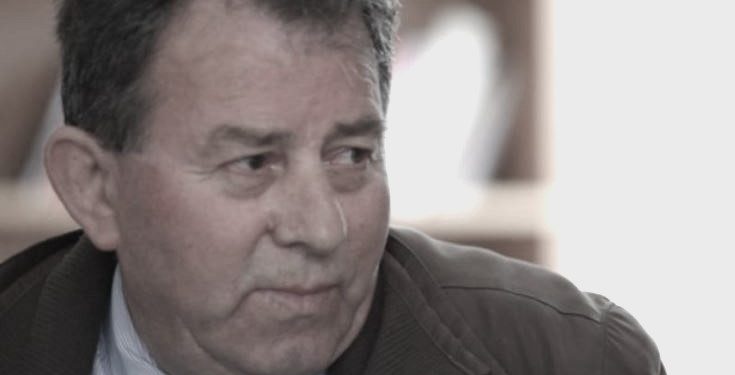
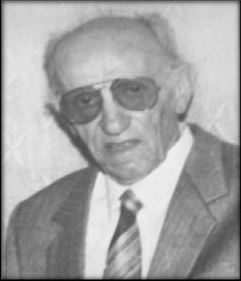
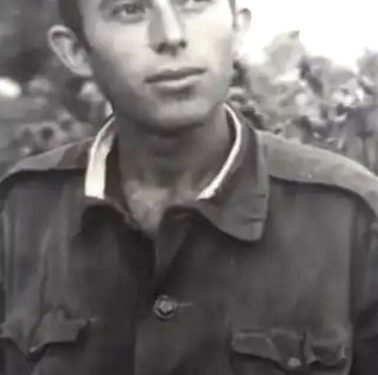
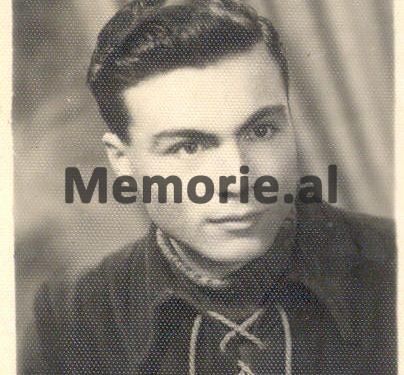
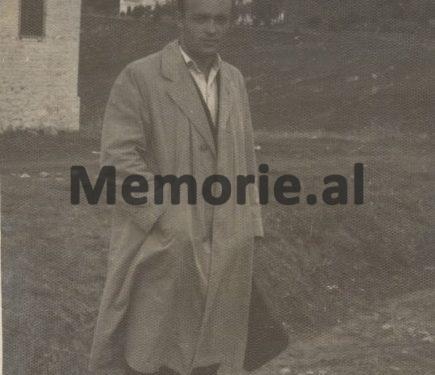
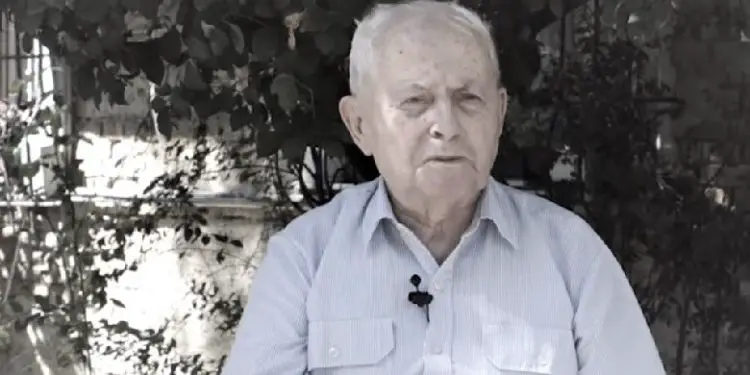
![“When the party secretary told me: ‘Why are you going to the city? Your comrades are harvesting wheat in the [voluntary] action, where the Party and Comrade Enver call them, while you wander about; they are fighting in Vietnam,’ I…”/ Reflections of the writer from Vlora.](https://memorie.al/wp-content/uploads/2025/06/admin-ajax-4-350x250.jpg)


![“The ensemble, led by saxophonist M. Murthi, violinist M. Tare, [with] S. Reka on accordion and piano, [and] saxophonist S. Selmani, were…”/ The unknown history of the “Dajti” orchestra during the communist regime.](https://memorie.al/wp-content/uploads/2026/02/admin-ajax-3-350x250.jpg)
![“In an attempt to rescue one another, 10 workers were poisoned, but besides the brigadier, [another] 6 also died…”/ The secret document of June 11, 1979, is revealed, regarding the deaths of 6 employees at the Metallurgy Plant.](https://memorie.al/wp-content/uploads/2026/02/maxresdefault-350x250.jpg)

